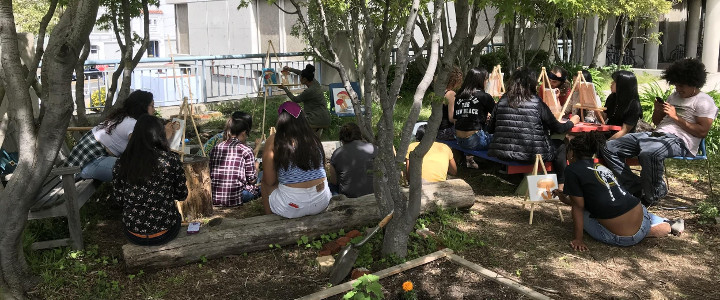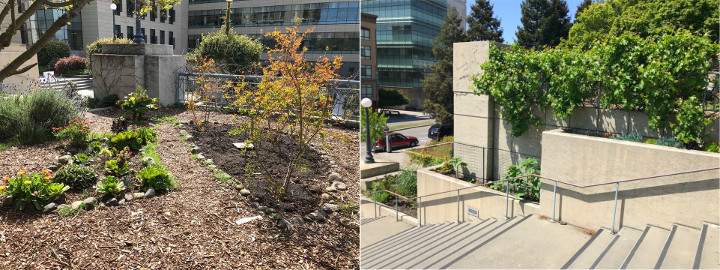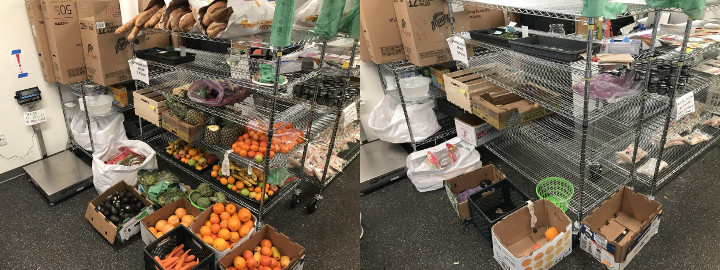Written by William Aubrey Smith IV
Spring 2018
My semester’s journey with food has shown me ways I can continue creating positive impacts for the larger campus community. In the recent months, I have been facilitating a student-lead food justice class at UC Berkeley as well as working as an intern for the Basic Needs Security Team. Working on two different projects has exposed me to levels in the food systems I have never seen before. In seeing the interconnected parts of the campus foodways first-hand, my gratitude for the volunteers, workers, and families involved in this truly world-wide network grew stronger. Most importantly, this semester’s journey with food has taught me about the power of community and how our connection to each other is the only way we can combat the oppressive food systems we live in today.
The first aspect of my project was co-facilitating a DeCal, a student-lead class that’s focused on gardening and food justice issues. The last day of our class we we had our celebration potluck. The day before, my co-facilitator, Ashley, and I gathered and harvested food from around the Berkeley campus, gardens, and nearby residents. The next morning we set up the picnic table at our main garden space by Barker Hall and upon our students arrival we explained the origins behind our meal, gave space to reflect on class experiences, and talked about plans for the garden in the future. We then ate a meal together, watered our plants, organically socialized, and left our separate ways. The reason I start explaining my project here is because this is the purpose- not only of school or gardening- but of life. The work that Ashley and I put into collecting and cooking a meal symbolized the unity we have created with the students all semester by sharing this garden space.

Learning from our outside environment, sharing food, and building community is the whole idea of the DeCal I have been teaching, called Sustainable Campus Landscaping and Ecological Design. This DeCal has been around since 2014, and has been based on the purpose of creating more intentional green spaces on campus. For the last 4 years, students in the DeCal have used vacant spaces by Giannini Hall, Mulford Hall, and Barker Hall to garden and landscape in more environmentally conscious ways. However, as the issues around food access became more prevalent on campus, the student facilitators have focused more on food productivity and teaching about food justice. Unfortunately, 40% of undergraduate students at UC Berkeley are food insecure and even more are clueless about where their food comes from or how it is made.
Therefore, this DeCal teaches basic gardening skills while also focusing on the historical and political context of food movements, policies, and practices.We emphasize how growing our own food directly rebels against the oppressive and capitalistic food systems that degrades nature, culture, and people. Our reclamation of vacant spaces on the Berkeley campus is our form of advocacy against the non-prioritization of student-agriculture and food security on campus. This class also emphasizes how all people have very deep cultural roots with stewarding the land and should, therefore, have the right to a safe and accessible means of connecting with nature through food and comfortable green spaces. Our guest speaker Wanda Stewart, the Hoover Elementary Master Gardener, came speak to the class about food, culture, race, and how education in garden spaces brings us back to our roots. Our field trip to the Botanical Garden also allowed us to talk to a professional horticulturist about the importance of connecting to the environment and the uniqueness of being in green spaces. By simply getting our 15-student class in the garden every Monday we already displayed acts of resistance by breaking down the constructs of the classroom and giving students hands-on opportunities to apply agriculture knowledge. For example, our class has successfully grown a multitude of culturally relevant crops (corn, chayote, collard greens, bok choy, etc.), arranged seating areas and signage for the garden, and designed raised beds to extend our food-growing capacity. This garden space has come to represent student learning, community, and empowerment by student groups taking the self-initiative to make something out of nothing.

However, the garden is not the only place I was able to find actions of resistance against a capitalistic food systems. One thing that I did in conjunction with managing the DeCal is an internship with the Basic Needs Security Team under Meg Prier, the Campus Garden Coordinator. For background, Basic Needs Security refers to the food, housing, and wellness security of the student community and Meg’s position involves coordinating with all the campus gardens and food related projects on campus. Though this internship was separate from running the DeCal and the garden, the correlations in purpose are clear- creating a positive college experience for students while providing them with the tools necessary to live healthy and sustainable lives.
With this Basic Needs internship I’d be working at the Oxford Tract and the UC Berkeley Food Pantry to make sure that harvests and deliveries to the pantry were scheduled and completed. This required me showing up to the Food Pantry before it opened twice a week to stock, label and organize the produce. Once a week I would also harvest produce from the Oxford Tract to deliver to the pantry. Doing all these tasks revealed more insight on the consumer-end of food, allowing me to really reflect on people’s dietary choices and their methods of shopping. I was also able to gain invaluable skills in harvesting, delivery, stocking, and maintenance of produce. Seeing the interconnected effort that goes into a food pantry really made me appreciate the everyday work that people do to provide the food we eat. But unfortunately, I was also able to witness the huge disparity in the students’ access to fresh produce. The packaged food that is in the pantry is always abundant while the fresh produce usually gets taken quickly and doesn’t have an adequate means for storage for increased shelf life.

This realization brought me back to a larger issue behind the food systems that relates healthy food access to dietary choices. Unfortunately, people of color are more likely to suffer from food related illnesses and food insecurity. Though the CalFresh programs work to get students resources for buying produce- it doesn’t address deeper rooted issues. Most of the times people are choosing foods that are convenient, quick, and familiar rather than healthy fresh food they can cook. So another objective for my semester was creating more garden community around different spaces so that there is a more direct connection between the food, the food producing space, and the people that need the food. A large success I had in this goal was getting a grant approved from The Green Initiative Fund (TGIF) to implement a garden at the Fannie Lou Hamer Black Resource Center. Myself including some other black friends who go to Cal, were able to secure funding and an appropriate location to implement a food producing space right outside a center that serves an underprivileged community on campus. This closes in more of the gaps that create barriers between people and their ability to grow and eat healthy and cultural food.
My work around the food systems has felt very disoriented at times since I have been working two different projects without seeing their clear connections with each other. However, I’ve come to see that I am the person to help close those gaps and bring more inclusivity into the campus food systems. Through working the DeCal I have gained a huge appreciation for teaching and sharing my passion for growing food and using food for social justice work. The Basic Needs internship has showed me the power and importance of the “unsung hero”- the one who spends hours doing things no one notices or thinks about. The work I’ve done to increase efficiency of student food security has really opened my eyes to the resources that are both needed by students and available to students. This campus has a lot of money and resources tucked away into funds, programs, and private investments. But as students we have to stop waiting for administration to give us what we need and instead start, not only demanding it, but putting our needs into direct actions. We can all make a difference, and though we may not get to see the glory of our efforts, the generations following will thank us for our initiation towards change.
